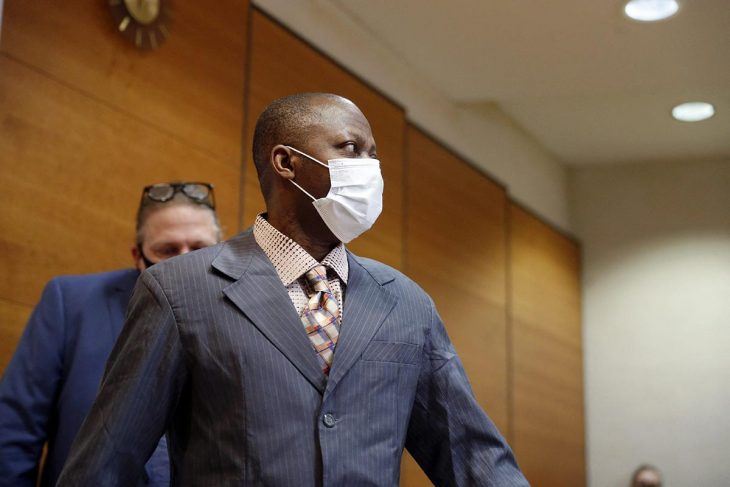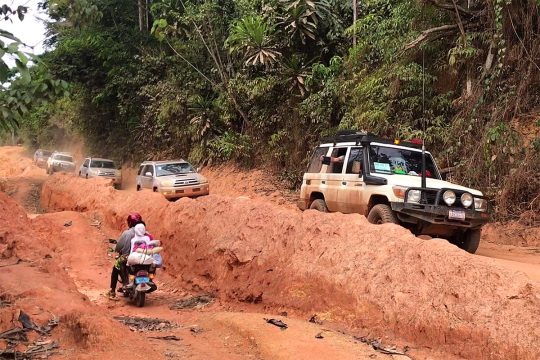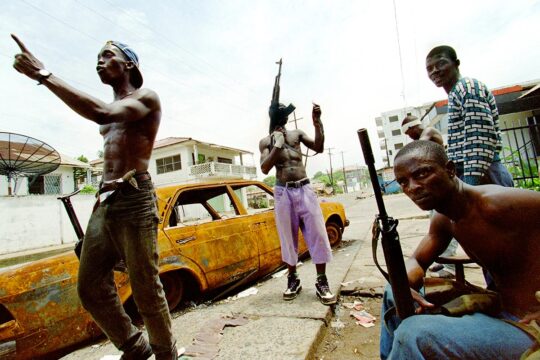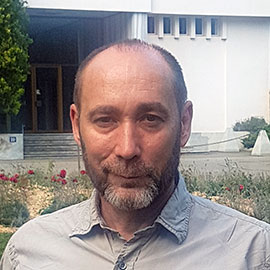This return was not planned. The Finnish court trying former Sierra Leonean rebel commander Gibril Massaquoi for crimes committed in Liberia between 1999 and 2003 has already held three months of hearings in Liberia and Sierra Leone from February to May this year. Seventy-three witnesses were heard about events in two parts of the country: the far north eastern province of Lofa and the commercial district of Waterside, in the heart of the Liberian capital Monrovia. Back in Finland, the court heard from a few more witnesses in June. It was supposed to start deliberating on the judgement, to be delivered in October. But the prosecutor's office believes there are new elements surrounding the alleged crimes in Monrovia and the alibi of the accused. It is therefore forcing the court to return to Liberia, and possibly Sierra Leone, for further witness hearings.
There are no new facts alleged. But at the heart of this unexpected twist is one of the major intrigues of the trial. Prosecution witnesses have given varying dates for the attack on Waterside, placing it in 2001, 2002 and 2003. During the hearings in Monrovia, several corrected the date they had given when questioned by investigators, changing it from 2003 to 2001 or 2002. The problem with 2003 is that Massaquoi had a seemingly watertight alibi at the time: he was a key informant for the prosecutor’s office of the Special Court for Sierra Leone, a UN court based in the Sierra Leonean capital Freetown. He was "probably the most important of all," according to Alan White, the court's former director of investigations.
Alibi backed by Special Court
The Finnish investigation established that Massaquoi was placed under the protection of the prosecutor's office in September 2002. Then, from March 10, 2003, he was placed under the responsibility of the court's witness protection unit. A written statement by the former head of the witness protection unit, senior Pakistani police officer Saleem Vahidy, is included in the Finnish investigation file. In it, Vahidy describes the conditions under which Massaquoi was kept in safe houses until he went into exile in Finland in August 2008. The former UN official writes that “it would be extremely unlikely for Massaquoi to leave the safe house without the knowledge of the WVS [Witness and Victims Section], and the question of being able to visit another country would be virtually impossible”.
Until recently, the Finnish prosecutor considered this alibi strong enough to support the claim that the crimes committed in Waterside occurred before 2003. However, there was one major obstacle to his thesis: the attack in central Monrovia described by witnesses could only have taken place between June and August 2003. The vast majority of witnesses mentioned there was fighting with a Liberian rebel movement, the LURD, and a front line on the Old Bridge over the Mesurado River, in the heart of the capital. However, this seems to describe only the very last months of the war, between June and August 2003, when LURD entered the capital and brought down the regime of Liberian President Charles Taylor.
The court heard from only one expert on the history of the conflict, Ilmari Käihkö, a former member of the Finnish armed forces who became a professor at the Swedish Defence University. Between 2012 and 2015, Käihkö investigated the events at Waterside. According to an unofficial transcript by the NGO Civitas Maxima of his court testimony last June, he confirmed that these events took place in the "summer of 2003", and more precisely "in July."
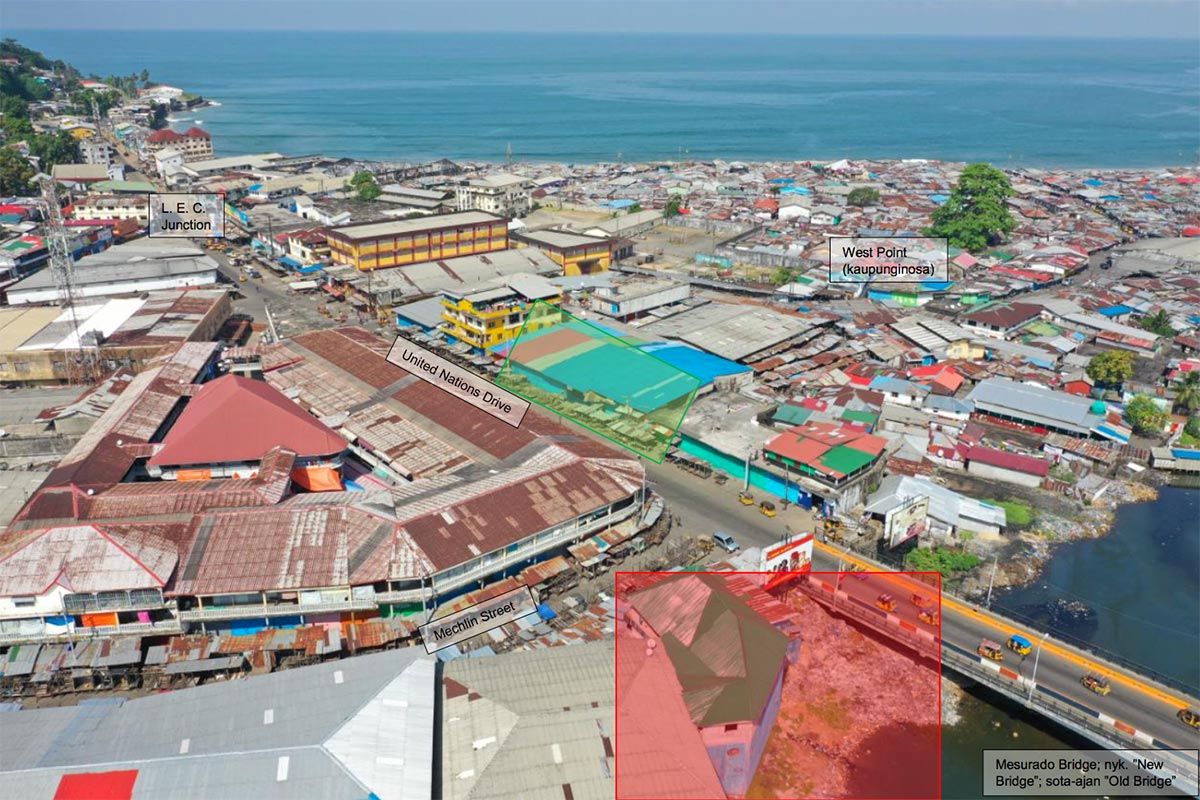
Could Massaquoi have escaped UN surveillance?
The prosecutor now seems to want to reconcile the testimonies of prosecution witnesses with this chronological reality. He explains that some defence witnesses, heard in Freetown in May, have weakened the alibi of the accused, making it appear that the accused could have escaped UN surveillance and been in Monrovia in June or July 2003. As a result, some witnesses who were dismissed by the prosecutor because they placed Massaquoi in Waterside that year may find new credibility. In other words, the prosecution's new theory would be to say that, yes, the events at Waterside did take place in 2003, and that Massaquoi was there because his alibi is porous.
The court battle reflects the radical incompatibility of the two sides of the story. Former members of the UN tribunal, including Massaquoi's protection officers, are likely to be called by the defence to argue that it was impossible for him to have escaped incognito from Freetown for several days in June-August 2003 to go to war-torn Liberia.
“Highly improbable”, according to Dufka
The defence has already gathered a testimony that is fraught with danger for the prosecution. On June 18, Corinne Dufka, a researcher at Human Rights Watch (HRW), was called as a witness at the Finnish court. Dufka conducted investigations in Sierra Leone between 1999 and 2003 for the American NGO and for the UN tribunal, for which she worked between October 2002 and October 2003. She recounted meeting Massaquoi eight times in Sierra Leone between June 2001 and September 2003. The first four times were in June-July 2001, when the conflict was still ongoing in Sierra Leone and Massaquoi was a spokesperson for the Sierra Leonean rebel group, the Revolutionary United Front (RUF). She saw him again at the end of January 2002 in Freetown, when the civil war had officially ended in that country. She saw him again on July 18, 2002, and again "in August," but she said she could not confirm the exact date because she no longer has her personal notes for that month.
It was Dufka who introduced Massaquoi to Alan White, the chief investigator of the UN tribunal, an initiative that would seal the fate of the former rebel. “I was under absolutely no delusions that Massaquoi had been guilty of horrible abuses and that he represented an organization guilty of several horrible atrocities,” she told the Finnish judges. But her research did not indicate that Massaquoi was among those most responsible for RUF crimes, she said. Prosecutors needed some "insider witnesses" in order to convict the leaders. In her eyes, Massaquoi was an ideal candidate for this role. So in August 2002, and again in September, she and White met with Massaquoi in Freetown.
- “We were told that Gibril Massaquoi was in the [witness protection] programme and his movements were quite limited. Do you think of him being able to travel to Monrovia in the summer of 2003?” the defence lawyer asked her.
- “I would find that highly unlikely. In that summer, the Liberian rebels launched an offensive against the capital Monrovia. At that time, Gibril Massaquoi was collaborating with the Special Court as an insider witness, and as I understand it, providing information on command structure and information against President Taylor. The indictment of Taylor [by the UN Tribunal for Sierra Leone] had been made public in June. So I find it unlikely that Massaquoi would have travelled to Monrovia to defend the capital, fighting on the same side as the person just indicted by the Special Court,” Dufka replied.
Dufka also told the court that other RUF commanders - such as Sam Bockarie and Dennis Mingo, alias Superman - had been assassinated at the time by Taylor to stop them testifying against him.
What did Lofa victims say in 2001-2002?
The human rights activist also proved an asset for the defence regarding the crimes of which Massaquoi is accused in Lofa province. She investigated these crimes for HRW in 2001 and 2002. "I spoke to 61 witnesses of [Liberian] government atrocities in Lofa county. The atrocities included massacres, rape, mutilation, destruction of property, looting and so on,” Dufka testified, according to an unofficial transcript of the hearing by Civitas Maxima. Six of these witnesses, interviewed between March and July 2002, were from the village of Kamatahun, a key location in the charges against Massaquoi. Their testimonies seem to relate the same facts as those alleged against Massaquoi, who is often identified by witnesses as calling himself "Angel Gabriel”. "They described an incident that they told had [taken] place in September-December 2001, in which the Liberian forces captured people trying to flee the violence and took them to an area near Kamatahun. (…) Afterwards, after an order of a commander, they were taken into three houses – one of the witnesses said four houses – and they were burnt alive,” the researcher told the court.
- “In these interviews, were there any names mentioned?” asked the defence lawyer.
- “Yes, there were. In the six of the testimonies, five mentioned Zig Zag Marzah as a commander, also known as Joseph Marzah. He was an infamous commander, and this name was repeated several times. The other commander named was Stanley. And there were a number of other lower level commanders named by the 61 witnesses with whom I spoke,” Dufka replied.
- “Did you write down the names they mentioned?”
- “Yes.”
- “Was there Angel or Angel Gabriel mentioned in the interviews conducted by you or your colleague?”
- “No, I do not recall that.”
- “Did anyone mention Gibril Massaquoi?”
- “No, they did not.”
- “You mentioned also several organizations and officials that you had talked to. Were there any commanders’ names mentioned?”
- “Yes. A part of the human right researcher’s job is to research command structures, so several names did come up. I discussed this with local community organizations, as well as members of think tanks, diplomats, refugee rights organizations, and so on.”
- “Did Angel Gabriel or Gibril Massaquoi ever come up?”
- “No.”
- “Just to make sure, did you visit Lofa personally?”, asked the prosecutor.
- “No I did not,” replied Dufka, who at the time interviewed Liberian victims who had taken refuge on Sierra Leone's border with Lofa.
Judges with limited power
The Massaquoi trial is governed by a procedure that can sometimes be perplexing. The judges, for example, have no knowledge of the more than 3,000-page file compiled by the investigators. They do not have any knowledge of Vahidy's written testimony to date. It is the parties alone who decide what they want to extract from this file to present to the judges, often in a very succinct form, at the hearing. And it is only on the basis of what is said, rather summarily, in court, that the magistrates will judge.
The judges also do not have the right to decide in advance on the suitability of the witnesses proposed by the parties, or to restrict the number of witnesses. There may now be up to 31 witnesses in the new session requested by the prosecutor, some of whom have already testified but will be questioned again. This is expected to take four to five weeks of hearings in Monrovia and possibly Freetown. All judicial personnel must be fully vaccinated against Covid-19 before traveling to West Africa. Contacted by Justice Info, the prosecutor and defence lawyer mentioned the possibility of going to the field at the end of August. On the judges’ side, they think it more reasonable to plan for September.
When it returns to Finland, the court will have to hear from at least three witnesses - including the American former director of UN investigations, Alan White, who has long promised to come and testify on behalf of the accused. Following the upcoming hearings in Monrovia, the defence may also want to call new witnesses. So a judgment is looking more and more unlikely before early 2022, in a case that is becoming increasingly complex.


